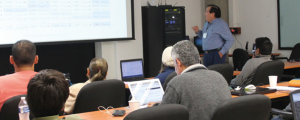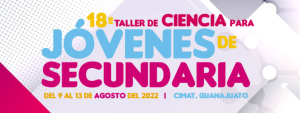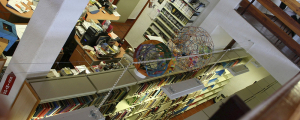Noticimat 26
Actividades del 08 al 12 de agosto de 2022
Seminarios

Seminario de Probabilidad
Lunes 08
Hora: 12:45 (CDMX)
Ponente: Samuel Johnston
Título: Continuous Kasteleyn theory and beads on the torus
Lugar: Salón de seminarios
Resumen: We develop a continuous version of Kasteleyn theory to study the bead model on the torus. These are the point processes on the semi-discrete torus Tn := [0, 1)×{0, 1, . . . , n−1} (thought of as n unit length strings wrapped around a doughnut) with the property that between every two consecutive points on same string, there lies a point on the neighbouring strings. We obtain an explicit formula for the volume of bead configurations with n strings and k beads per string. The asymptotics of this formula verify a recent conjecture of Shlyakhtenko and Tao (2020). in the setting of free probability. We study the correlation functions of the process, expanding on the work of Boutillier (2009). Various limits of our process recover certain Markov chains, and we show that TASEP on the ring may be constructed as an exponential change of measure of the noncolliding walkers of Gordenko (2020).
Web del seminario: https://www.cimat.mx/~jagil/Seminarios/Seminarios/Seminarios_2022.html
__________________________________________________________________________________
Coloquio CIMAT – DEMAT
Miércoles 10
Hora: 12:00 (CDMX)
Ponentes: Raúl Rojas González (Freie Universität Berlin), Francisco Sánchez Sánchez, Adolfo Sánchez Valenzuela (CIMAT), con la colaboración de Rafael Gamboa Hirales (ITAM)
Título: Métodos de Representación Proporcional para una Reforma Política en México
Enlace de Transmisión: https://us06web.zoom.us/j/81161632128?pwd=S0w4Y1lhendPNUxrUVpiejlkdllGdz09
Resumen: Desde hace tiempo se anunció que habría una reforma a la ley electoral que eliminaría las llamadas diputaciones plurinominales y que convertiría las diputaciones de los 300 distritos electorales existentes en diputaciones de representación proporcional. En esta charla queremos presentar las ideas básicas que hay detrás de los métodos y algoritmos más populares para asignar diputados de representación proporcional y presentar también algunos cálculos basados en estos diferentes métodos que sugieren que es mejor no eliminar la figura de las diputaciones plurinominales a fin de garantizar una representatividad de los partidos mucho más cercana a la proporción de votos obtenidos en las elecciones. Usamos los resultados de las elecciones del 2021 como laboratorio para probar los diferentes métodos y darnos cuenta de que no se requerirían más de unas cuantas diputaciones adicionales (entre 12 y 50 dependiendo del modelo) para conseguir que la representatividad de cada partido se acerque mucho a la proporcionalidad de los votos recibidos.
__________________________________________________________________________________
Seminario de Computación
Miércoles 10
Hora: 12:30 (CDMX)
Ponente: Dr. Victor Zavala (University of Wisconsin-Madison)
Título: Graph-Structured Optimization: Properties, Algorithms, and Software
Enlace de Transmisión: https://bluejeans.com/810722229
Resumen: We study properties for nonlinear optimization problems whose structures are induced by graphs. These problems arise in many applications such as dynamic optimization, optimal control, stochastic optimization, optimization with partial differential equations, and network optimization. We show that for a given pair of nodes, the sensitivity of the primal-dual solution at one node against a data perturbation at the other node decays exponentially with respect to the distance between these two nodes on the graph. In other words, the solution sensitivity decays exponentially as one moves away from the perturbation point. We discuss how this property provides new and interesting insights on the behavior of complex systems and how it enables the design of new decomposition and approximation algorithms and software. Specifically, we discuss model predictive control formulations with specialized time discretization approaches and overlapping Schwarz decomposition approaches for solving large-scale problems. We also show how to easily implement graph-structured problems in the Julia programming language.
__________________________________________________________________________________
Seminario de Topología en Dimensiones Bajas “Fico González Acuña”
Jueves 11
Hora: 11:00 (CDMX)
Ponente: John Luecke (The University of Texas at Austin)
Título: Fibered Simple Knots
Resumen: A simple knot is a knot in a lens space built from the union of a pair of properly embedded arcs, one in each of a pair of standard meridianal disks. We prove that a simple knot in the lens space L(p,q) fibers if and only if its order in homology does not divide any remainder occurring in the Euclidean algorithm applied to the pair (p,q). One corollary is that if p=m2 is a perfect square, then any simple knot of order m fibers, answering a question of Cebanu. More generally, we compute in a similar way the leading coefficient of the Alexander polynomial of a simple knot. This is joint work with Josh Greene.
Web del seminario: http://www.fico-ldtseminar.org
Eventos

18° Taller de Ciencia para Jóvenes de Secundaria
Martes 09 al sábado 13
El Centro de Investigación en Matemáticas (CIMAT) a través de la Coordinación de Divulgación presenta el 18° Taller de Ciencia para Jóvenes de Secundaria.
Dicho taller está dirigido a estudiantes de escuelas del Estado de Guanajuato.
El taller tiene el objetivo de acercar a los participantes a las matemáticas y la ciencia en general, a través de cursos, talleres, laboratorios y conferencias.
Conoce más información y el programa en:
Divulgación

Martes 09 al sábado 13
Se realizará el 18° Taller de Ciencia para Jóvenes de Secundaria. Dirigido principalmente a estudiantes de secundaria del Estado de Guanajuato, tiene por objetivo acercar a estudiantes de secundaria a las matemáticas y la ciencia en general, a través de cursos, talleres, laboratorios y conferencias.
Para obtener mayor información, visitar la página:
__________________________________________________________________________________
Martes 09 al viernes 12
Matemorfosis ofrecerá talleres de matemáticas recreativas en las bibliotecas públicas de los municipios de Silao y Romita. Estas actividades forman parte del evento “Las diferentes formas de leer”, impulsado por el Instituto Estatal de la Cultura a través de la Coordinación de Fomento a la Lectura y el Libro. Participan: Mariana Carnalla Cortés y Christian Dennis Olvera Torres.




Dejar un comentario
¿Quieres unirte a la conversación?Siéntete libre de contribuir!